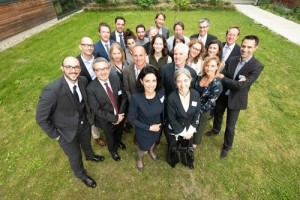SUSBIND’s highly sustainable bio-based binders will replace conventional fossil-based binders currently used for wood-based panel boards in furniture mass products. By substituting fossil-based chemicals with those from renewable resources, carbon footprint of furniture products will be reduced. This will help mitigate climate change and will also strengthen the European furniture industry through novel, cost-efficient eco-products. SUSBIND is a collaborative European research and innovation project in the field of bioeconomy with 11 partners from 6 EU countries funded by the Biobased Industry Consortium (BBI-JU) under the European Union’s Horizon 2020 Programme.

The wood-based panel industry currently relies on the use of non-renewable, fossil-based binders – mainly formaldehyde-based. Several market factors are driving major changes in the composition and technology of these adhesives in the European Union (EU). Upcoming regulations foresee reduced formaldehyde emissions from furniture, due to its effects on indoor air-quality (IAQ).
Manufacturers have made several attempts to produce alternative binders from renewable resources, but a bio-based binder able to compete with existing chemicals on an industrial scale, does not yet exist. In order to cope with increasing global consumption and climate change, innovative products in the wood-based panel mass market are urgently needed to reduce greenhouse gas emissions and the industry’s dependency on fossil fuel-based products.
Away from fossil based-materials, towards sustainable renewables
SUSBIND is currently developing low VOC (volatile organic compound) emission bio-based binders for furniture by using surplus feedstock sourced from European biorefineries and non-fossil-based chemicals from renewable resources. Lab-scale studies on chemical and enzymatic synthesis of the most promising furfural and epoxy type binder components are being performed. Once the components are ready, the new renewable bio-based binders will be tested and validated with leading wood board manufacturers (IKEA and EGGER) for two product types P2 particle board and medium density fibreboard. SUSBIND’s highly skilled researchers are in charge of verifying environmental and market regulatory requirements for the bio-based binder system. They also ensure that the newly produced binder has a smaller carbon footprint and less human health impact.

Bioeconomy high on the EU Agenda: SUSBIND’s impact on EU economy
SUSBIND is a collaborative European research and innovation project in the field of bioeconomy addressing the need for more sustainable bio-based binders used for wood-based panel boards in European furniture industry.
The main idea behind the bioeconomy concept is to use biological resources instead of fossil raw material. It combines research, innovation, technology, environment & economy. Bioeconomy takes an integrative multidisciplinary approach, it is a collaborative effort between different fields, using the know-how of technical and natural sciences with a goal to create innovations that would have economic and environmental benefit.
Bioeconomy stands high on the EU Agenda. The Europe 2020 Strategy and the Updated 2018 Bioeconomy Strategy calls for bioeconomy as a key element for smart and green growth in Europe. As stated in the strategy paper, in order to cope with an increasing global population, rapid depletion of many resources, increasing environmental pressures and climate change, Europe needs to radically change its approach to production, consumption, processing, storage, recycling and disposal of resources.
The Biobased Industries Joint Undertaking (BBI-JU) has a budget of €3.7 billion raised between the EC and industry for the current legislative period, which is complemented by another €6.8 billion in H2020. At least another €10 billon of funding is earmarked for the bioeconomy research and innovation in the upcoming Horizon Europe programme.
About SUSBIND
The SUSBIND consortium implements bioeconomy with partners covering the value chain from research on the one hand and large industry and small and medium enterprises (SMEs) on the other that brings together 11 partners from six EU countries: Austria, Germany, the Netherlands, Spain, Sweden and Portugal. The project stated on 1 May 2018 and will run for a duration of four years. With a budget of € 5,5 Million: it receives € 4,1 Million public funding from the Bio-Based Industries Joint Undertaking (BBI-JU) under grant agreement No. 792063. The BBI-JU receives support from the European Union’s Horizon 2020 research and innovation programme and the Bio-Based Industries Consortium.
The project has highly skilled partners with extensive technological background and research excellence, along with strong private sector involvement to pursue market uptake. SUSBIND aims to contribute to the transformation of Europe towards a resource-efficient society that relies more on utilising renewable biological resources which in turn, will have a positive effect climate change, human health and satisfy consumer needs and industrial demands.
Find more information on the project on our project website and on its factsheets and other dissemination material available online. Get the latest news by subscribing to the SUSBIND Newsletter and by following us on Twitter and LinkedIn.
Text by Ana Babić, RTDS


